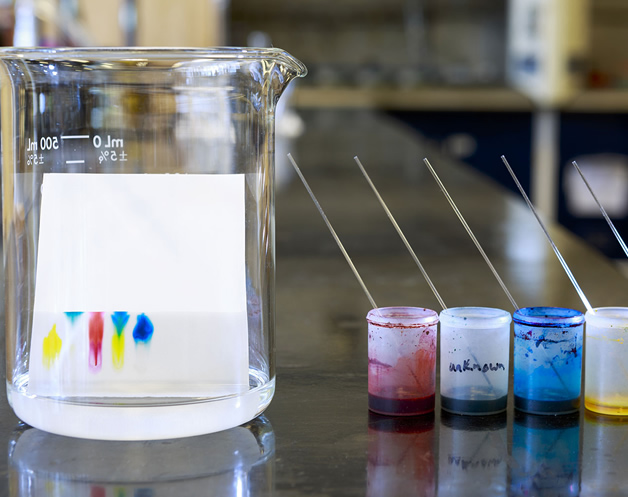Chromatography
Chromatography (/ˌkroʊməˈtɒɡrəfi/; from Greek χρῶμα chroma which means “color” and γράφειν graphein “to write” is a laboratory technique for the separation of a mixture. The mixture is dissolved in a fluid called the mobile phase, which carries it through a structure holding another material called the stationary phase. The various constituents of the mixture travel at different speeds, causing them to separate. The separation is based on differential partitioning between the mobile and stationary phases. Subtle differences in a compound’s partition coefficient result in differential retention on the stationary phase and thus changing the separation.
Chromatography may be preparative or analytical. The purpose of preparative chromatography is to separate the components of a mixture for more advanced use (and is thus a form of purification). Analytical chromatography is done normally with smaller amounts of material and is for measuring the relative proportions of analytes in a mixture. The two are not mutually exclusive.
CELKHA BIOSCIENCES intends to cover the following areas of chromatography; Techniques by chromatographic bed shape; Column chromatography, Planar chromatography, Paper chromatography, Thin layer chromatography (TLC) and Techniques by physical state of mobile phase; Gas chromatography, Liquid chromatography, Affinity chromatography, Supercritical fluid chromatography as well as Techniques by separation mechanism; Ion exchange chromatography, Size-exclusion chromatography, Expanded bed adsorption chromatographic separation. Others includes; Special techniques, Displacement chromatography, Reversed-phase chromatography, Hydrophobic interaction chromatography, Two-dimensional chromatography, Simulated moving-bed chromatography, Pyrolysis gas chromatography, Fast protein liquid chromatography, Countercurrent chromatography, and Chiral chromatography

